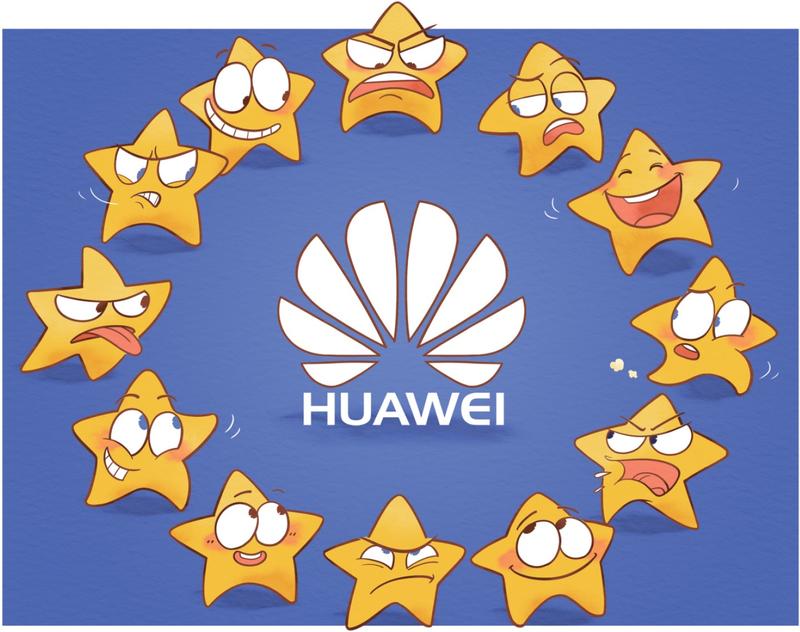 (SONG CHEN / CHINA DAILY)
(SONG CHEN / CHINA DAILY)
With the United States continuing to lobby its allies to ban Huawei from their 5G networks, European countries have become more ambivalent about partnering the Chinese telecommunications equipment giant.
Washington has been putting pressure on European countries through various means, including spreading rumors that China uses Huawei's technology to spy on other countries, threatening to stop sharing intelligence with countries that use Huawei's 5G technology, and imposing sanctions on Huawei and those supplying it microchips. This has prompted many countries to rethink their decision to use Huawei products and technology.
The United Kingdom government, for example, has indicated it would gradually reduce Huawei's share in-and ultimately exclude it from-the country's telecom sector. Also, British Prime Minister Boris Johnson has proposed a 10-country telecom alliance, called "D10 Club", to prop up Huawei's competitors. And the Czech Republic, Poland, Sweden, Estonia, Romania, Denmark, Latvia and Greece have agreed to use vendors other than Huawei in their 5G networks.
FedSince European countries are committed to strengthening their strategic independence and remain at the forefront in different fields, they cannot cease cooperation with Huawei and other Chinese companies because by doing so they could miss taking the lead in network technology
Countries such as Italy and the Netherlands have persisted with Huawei as a vendor. But Spain, Portugal, Austria, Finland and some other European countries have been mulling whether to declare Huawei as a "high-risk company". Due to the continuous blustering of the US, more countries now suspect that Huawei could use the loopholes in their telecom systems to conduct surveillance operations. Which means Huawei faces increasing resistance in European countries.
Worse, since the US has been blaming China for the novel coronavirus pandemic, which apart from claiming more than half a million lives has also caused global economic recession, many countries have become hostile toward China, and many European states have limited the role of Huawei in or banned it from their telecom sectors.
But it would be difficult for European countries to completely ban Huawei from their 5G networks. Besides, it's not in European countries' interest to completely ban Huawei from their 5G infrastructure construction, as the Chinese company's equipment have been widely used in European countries' telecom industry-Huawei has 45 percent share in the European market for 4G radio access network (RAN) products, the critical asset of mobile communication. Major British mobile network operators such as Vodafone, EE, O2 and 3, have used Huawei equipment to build their 5G networks. And all of them still use some Huawei equipment or the other, with 62 percent of Vodafone's network equipment being Chinese-made.
Therefore, as Hosuk Lee-Makiyama, director of European Centre for International Political Economy, told Voice of America (Mandarin)," (European network operators) are lobbying hard against their governments to make sure that Huawei continues to be allowed in the European markets".
Those who want the launch of 5G technology to be based on the 4G networks should realize that European countries have to spend much more money and time to build 5G infrastructure if they exclude Huawei. UK Consultancy Assembly estimates that the exclusion of Huawei would delay 5G construction by two years and cause a potential economic loss of£7 billion (US$8.71 billion). And the US Federal Communications Commission has asked Congress for US$2 billion to replace Chinese equipment in US rural networks.
No wonder European countries are not necessarily willing to follow the US and ban Huawei to counter China. China and European countries have close ties in trade and economy. And at the China-European Union summit via videoconferencing on June 22, both sides stressed the importance of working together to boost economic growth and development.
Moreover, there is no evidence to prove the Chinese government has used Huawei's products to conduct cyber-spying or the company's "back door" technology to monitor networks in European countries. Huawei has never rejected supervision. In fact, Huawei was under the UK's review in 2010 with the establishment of the Huawei Cyber Security Evaluation Centre. And the Chinese telecom giant opened cybersecurity centers in Bonn and Brussels in 2018 and 2019 respectively.
European countries' doubts over Huawei are a result of over-politicization of economic and technological issues because European countries have wrongly linked the Chinese government with Huawei. But the cracks in the transatlantic alliance have prevented many European countries from totally banning Huawei. Germany and the US have been at loggerheads since a report in 2013 said the US National Security Agency had hacked German Chancellor Angela Merkel's mobile phone, although Germany closed the investigation, rather than pursuing the case in court.
And since France has security ambitions of its own, it has tried to take the lead in various issues including 5G security in Europe. At a time when European countries have adopted different approaches toward 5G and Huawei, the US seems to be making a futile attempt to pressure them to completely ban Huawei.
Although European countries will continue to tighten security regulations against Huawei and more cautiously use its technology, they may not entirely exclude Huawei from their telecom sectors because they know nationalism and ideological bias cannot help solve problems in the age of globalization. Since European countries are committed to strengthening their strategic independence and remain at the forefront in different fields, they cannot cease cooperation with Huawei and other Chinese companies because by doing so they could miss taking the lead in network technology.
Tian Dewen is deputy director of the Institute of European Studies at the Chinese Academy of Social Sciences, and Tian Yuewan is a doctoral candidate at the Chinese Academy of Social Sciences.
The views don't necessarily represent those of China Daily.


